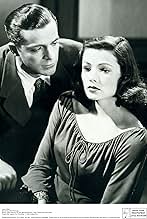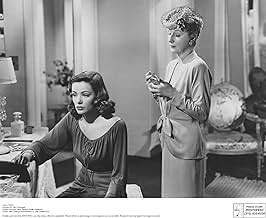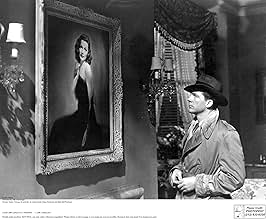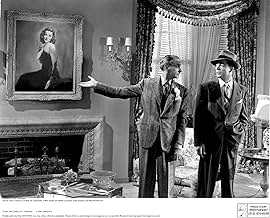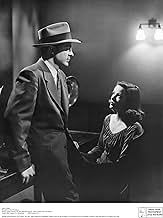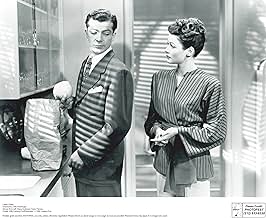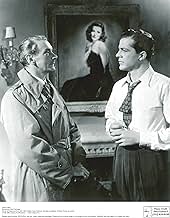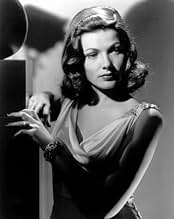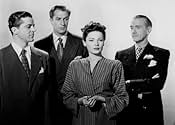Laura
- 1944
- Tous publics
- 1h 28m
IMDb RATING
7.9/10
54K
YOUR RATING
A police detective falls in love with the woman whose murder he is investigating.A police detective falls in love with the woman whose murder he is investigating.A police detective falls in love with the woman whose murder he is investigating.
- Won 1 Oscar
- 7 wins & 5 nominations total
Grant Mitchell
- Lancaster Corey
- (scenes deleted)
Dorothy Adams
- Bessie Clary - Laura's Maid
- (uncredited)
Terry Adams
- Woman
- (uncredited)
John Alban
- Executive
- (uncredited)
Wally Albright
- Newsboy
- (uncredited)
Bobby Barber
- Newsboy
- (uncredited)
Edward Biby
- Party Guest
- (uncredited)
Gary Breckner
- Narrator
- (uncredited)
James Carlisle
- Party Guest
- (uncredited)
Harry Carter
- Party Guest
- (uncredited)
Lane Chandler
- Detective
- (uncredited)
Bill Chaney
- Newsboy
- (uncredited)
Dorothy Christy
- Woman
- (uncredited)
Featured reviews
I'm not sure if "Laura" truly qualifies as a film noir, although it certainly looks the part. If anything, it is a bridge between the standard romantic dramas of the '30s and '40s and the far darker truly noir films, such as "Double Indemnity," in which the main characters are either weak, desperate, or truly evil.
Tierney, here, is luminous as always, but hardly unsympathetic. And Andrews is your basic Dick Tracy -- colorless, but solid and honest. It's no surprise then that Webb walks off with the film, but his character is significant in other ways. Outwardly fey, Waldo is a variation on the stock "gay" Hollywood character seen at a time when homosexuality was hinted at but never really acknowledged. He insists he loves Laura, but there appears to be no actual love affair. He chooses her clothes and hairstyles, shows her off on his arm, but never seems to have any real physical contact with her. (The visual clue is his apartment, filled with pretty things that no one is allowed to touch, although Waldo will gladly tell you how expensive they are.) His scenes with Andrews become far more complex in this context, particularly when he discusses the case with the detective from his bath. Their verbal sparring continues throughout the film, and Webb makes frequent remarks about why women find Andrews' type so alluring, while they reject more "refined" males of taste and breeding. But Webb's Waldo, despite the refinement, is a catty and cruel little monster, a man who writes of love, but has none in his life. Unlike David Wayne's comic sissy in "Adam's Rib," who repeatedly proclaims his love and adoration for Katharine Hepburn's Amanda, Webb's Waldo has an edge so vile that we fear him, and, because of that, can accept him as a suspect.
The film is also notable for Vincent Price's performance as a needy boy-toy who is manlier than Webb, but still sexually vague, indecisive and weak. Viewers unaccustomed to seeing Price in such roles may think he was miscast. Perhaps he was, but he seems to be doing precisely what he was supposed to do, giving Laura another worldly but inappropriate suitor.
The plot, predictable or not, is great fun; a bit of a whodunit with a psychological edge. The score is legendary, and like the painting Andrews falls in love with, the music gives the film its haunting quality, particularly at those moments when we segue into another flashback.
There's a bit of inscrutability in most of Tierney's performances, which makes her perfect for this role. We rarely know what she's thinking, or precisely how she feels about the other characters. And because of this, her flashbacks provide few clues as to why anyone would want to murder her.
There are a few other suspects, of course, including the great Judith Anderson, and there's even a smart little cocktail party where you can look them over one more time. As for who really did kill Laura -- well, good luck with that one.
Tierney, here, is luminous as always, but hardly unsympathetic. And Andrews is your basic Dick Tracy -- colorless, but solid and honest. It's no surprise then that Webb walks off with the film, but his character is significant in other ways. Outwardly fey, Waldo is a variation on the stock "gay" Hollywood character seen at a time when homosexuality was hinted at but never really acknowledged. He insists he loves Laura, but there appears to be no actual love affair. He chooses her clothes and hairstyles, shows her off on his arm, but never seems to have any real physical contact with her. (The visual clue is his apartment, filled with pretty things that no one is allowed to touch, although Waldo will gladly tell you how expensive they are.) His scenes with Andrews become far more complex in this context, particularly when he discusses the case with the detective from his bath. Their verbal sparring continues throughout the film, and Webb makes frequent remarks about why women find Andrews' type so alluring, while they reject more "refined" males of taste and breeding. But Webb's Waldo, despite the refinement, is a catty and cruel little monster, a man who writes of love, but has none in his life. Unlike David Wayne's comic sissy in "Adam's Rib," who repeatedly proclaims his love and adoration for Katharine Hepburn's Amanda, Webb's Waldo has an edge so vile that we fear him, and, because of that, can accept him as a suspect.
The film is also notable for Vincent Price's performance as a needy boy-toy who is manlier than Webb, but still sexually vague, indecisive and weak. Viewers unaccustomed to seeing Price in such roles may think he was miscast. Perhaps he was, but he seems to be doing precisely what he was supposed to do, giving Laura another worldly but inappropriate suitor.
The plot, predictable or not, is great fun; a bit of a whodunit with a psychological edge. The score is legendary, and like the painting Andrews falls in love with, the music gives the film its haunting quality, particularly at those moments when we segue into another flashback.
There's a bit of inscrutability in most of Tierney's performances, which makes her perfect for this role. We rarely know what she's thinking, or precisely how she feels about the other characters. And because of this, her flashbacks provide few clues as to why anyone would want to murder her.
There are a few other suspects, of course, including the great Judith Anderson, and there's even a smart little cocktail party where you can look them over one more time. As for who really did kill Laura -- well, good luck with that one.
"Laura" is a classic murder mystery and more. The main characters make for a fascinating psychological study, and the movie is also filled with wit and style, in addition to a murder mystery that holds plenty of interest in its own right.
The story opens with a detective (Dana Andrews) questioning suspects in the murder of popular, beautiful, and successful Laura Hunt. As he does, we learn not only about the suspects but about Laura herself, through flashbacks. We see Laura (Gene Tierney) develop the career and relationships that eventually led to danger, and we also learn that Laura meant something very different to each of the suspects: the snobbish, venomous writer who launched her career (Clifton Webb), the worthless playboy whom Laura was going to marry (Vincent Price, in a role quite different for him) and her rather desperate aunt (Judith Anderson). Even the detective quickly becomes obsessed with Laura's memory. The psychological overtones of all this add considerably to the mystery plot.
The mystery story itself is quite good, with interesting details and at least one major surprise along the way. The climax is tense and exciting, a fitting conclusion to both the mystery plot and the complex relationships among the characters. The acting and direction are all very good, and make the most of the story's possibilities.
"Laura" is a must-see not only for those who like mysteries, but for anyone who likes classic cinema made with style.
The story opens with a detective (Dana Andrews) questioning suspects in the murder of popular, beautiful, and successful Laura Hunt. As he does, we learn not only about the suspects but about Laura herself, through flashbacks. We see Laura (Gene Tierney) develop the career and relationships that eventually led to danger, and we also learn that Laura meant something very different to each of the suspects: the snobbish, venomous writer who launched her career (Clifton Webb), the worthless playboy whom Laura was going to marry (Vincent Price, in a role quite different for him) and her rather desperate aunt (Judith Anderson). Even the detective quickly becomes obsessed with Laura's memory. The psychological overtones of all this add considerably to the mystery plot.
The mystery story itself is quite good, with interesting details and at least one major surprise along the way. The climax is tense and exciting, a fitting conclusion to both the mystery plot and the complex relationships among the characters. The acting and direction are all very good, and make the most of the story's possibilities.
"Laura" is a must-see not only for those who like mysteries, but for anyone who likes classic cinema made with style.
A superbly stylish movie. None of its characters is without flaws - even the elusive Laura is too naive for her own good. They are presented lovingly by Preminger, and his award-winning DOP Joseph LaShelle.
The excellent script ranges from caustic Laedecker/Webb put-downs, through brutal Treadwell/Anderson self-assessment, to laconic MacPherson/Andrews minimalism.
The score is, of course, a classic. Raksin's sinuous melody, brilliantly deployed, haunts the picture as powerfully as Laura's portrait haunts Detective MacPherson.
The central performances are wonderful, not least because of the perfect casting. Tierney shines as the enigmatic title character: beautiful, intelligent, somehow both cool and passionate at the same time. Webb dazzles, Price slithers, Anderson simmers. Best of all is Andrews as the detective who barely opens his mouth when he speaks, and on whose face desire barely flickers - but he does enough to show you exactly what he wants and how he feels. It's a great movie performance from an underrated actor. Only Dorothy Adams doesn't quite fit, in a role - Laura's maid - that could easily have been as showy as the others with the right performer.
LAURA doesn't appear to be about anything significant, but it leaves behind it a feeling that it is greater than the sum of its parts. I don't know how this was managed, and perhaps no-one involved in it did either. It's one of those movies where everything just clicked. Seeing it again recently, after many years, confirms its status for me as a significant work, but exactly why or how remains as much of a puzzle as Laura herself.
The excellent script ranges from caustic Laedecker/Webb put-downs, through brutal Treadwell/Anderson self-assessment, to laconic MacPherson/Andrews minimalism.
The score is, of course, a classic. Raksin's sinuous melody, brilliantly deployed, haunts the picture as powerfully as Laura's portrait haunts Detective MacPherson.
The central performances are wonderful, not least because of the perfect casting. Tierney shines as the enigmatic title character: beautiful, intelligent, somehow both cool and passionate at the same time. Webb dazzles, Price slithers, Anderson simmers. Best of all is Andrews as the detective who barely opens his mouth when he speaks, and on whose face desire barely flickers - but he does enough to show you exactly what he wants and how he feels. It's a great movie performance from an underrated actor. Only Dorothy Adams doesn't quite fit, in a role - Laura's maid - that could easily have been as showy as the others with the right performer.
LAURA doesn't appear to be about anything significant, but it leaves behind it a feeling that it is greater than the sum of its parts. I don't know how this was managed, and perhaps no-one involved in it did either. It's one of those movies where everything just clicked. Seeing it again recently, after many years, confirms its status for me as a significant work, but exactly why or how remains as much of a puzzle as Laura herself.
'Laura' is one of the most entertaining mystery movies I've ever seen. A mystery? Also a romance, a Film Noir and even in some ways a comedy. It's quite a unique movie from the legendary Otto Preminger, who took over from the original director and started from scratch. Gene Tierney plays the title character, a woman who seems to bewitch every man she meets. It's no wonder because Tierney is mesmerizing to watch. I think she could well be the most beautiful actress of all time. Dana Andrews, Vincent Price and Clifton Webb play the three men in Laura's life. Andrews ('Night Of The Demon') plays a detective investigating Laura's apparent murder, Price, years before becoming a horror icon, a gigolo type who is due to marry her, and Webb (best known as Mr. Belvedere) is a snobby columnist and wit who is Laura's mentor. All four actors are just terrific and the plot is full of twists and surprises. I enjoyed this movie from start to finish. 'Laura' is one of the very best Hollywood movies of the 1940s. Highly recommended
The first time I saw this film, about eight years ago I ended up almost losing a friend because I was hoarding the VHS copy he had lent me for about two months. After seeing it, I quite simply didn't want to give up the tape because in doing so, I wouldn't be able to watch it anytime I wanted to; and I did watch it anytime I wanted to, and often, until he threatened to call a Noir Intervention. I may have loved this film from the first viewing, but I wasn't prepared to deal with something like that, as entertaining as it may have been.
I fell in love with `Laura' because it is biting and evil, intelligent and surprising. The unfathomably gorgeous Gene Tierney plays the title character, an advertising executive whose best friend Waldo Lydecker (played by the always wonderful Clifton Webb) and fiancée Shelby, (a really young Vincent Price) are some of the prime suspects in her murder. The gruff detective leading the case (Dana Andrews) is Det. McPherson, and he quickly essentially falls in love with a ghost while he is trying to solve her murder.
`Laura' has one of the great Noir scripts in that just as the audience thinks they have the case solved, another curve ball is thrown at them which blows that theory out of the water. The acting is pure delightful melodrama, but Clifton Webb's performance is simply show-stopping. His character is a vicious snit of a writer who uses his column as a weapon against anyone he doesn't like or even tolerate. Even upon multiple viewings I can't help but howl at some of his lines and mannerisms.
If anyone was to request suggestions for good Film Noir movies, I would prescribe a heavy dose of `Laura' because it has something for everyone in that it is romantic, thrilling, mysterious, wickedly funny and above all, thoroughly entertaining.
--Shelly
I fell in love with `Laura' because it is biting and evil, intelligent and surprising. The unfathomably gorgeous Gene Tierney plays the title character, an advertising executive whose best friend Waldo Lydecker (played by the always wonderful Clifton Webb) and fiancée Shelby, (a really young Vincent Price) are some of the prime suspects in her murder. The gruff detective leading the case (Dana Andrews) is Det. McPherson, and he quickly essentially falls in love with a ghost while he is trying to solve her murder.
`Laura' has one of the great Noir scripts in that just as the audience thinks they have the case solved, another curve ball is thrown at them which blows that theory out of the water. The acting is pure delightful melodrama, but Clifton Webb's performance is simply show-stopping. His character is a vicious snit of a writer who uses his column as a weapon against anyone he doesn't like or even tolerate. Even upon multiple viewings I can't help but howl at some of his lines and mannerisms.
If anyone was to request suggestions for good Film Noir movies, I would prescribe a heavy dose of `Laura' because it has something for everyone in that it is romantic, thrilling, mysterious, wickedly funny and above all, thoroughly entertaining.
--Shelly
Did you know
- TriviaAccording to Producer and Director Otto Preminger, he had to work to win the respect of the cast, who all seemed "hostile" to him when he took over, with the exception of Clifton Webb. "I learned later", he said, "that Mamoulian had called each of them individually and warned them that I did not like their acting and intended to fire them." It was not true. Dame Judith Anderson decided to confront him on the set. She said that if he wasn't happy with her performance, then he should show her how to make it better.
- GoofsIn the initial long-shot when McPherson and Lydecker are out to dinner, McPherson's chair is unoccupied (about 15:28). When the camera is at their table, McPherson has materialized.
- Quotes
Waldo Lydecker: I don't use a pen. I write with a goose quill dipped in venom.
- Alternate versionsA scene cut from the theatrical version after its initial release was restored to the film in 1990. In it, Waldo Lydecker described how he transformed Laura's appearance and introduced her to high society. The studio worried that this obsession with decadent luxury would be offensive to WWII soldiers serving overseas, so the scene was deleted.
- ConnectionsFeatured in Le crime était signé (1953)
Details
Box office
- Budget
- $1,020,000 (estimated)
- Gross worldwide
- $1,356
- Runtime
- 1h 28m(88 min)
- Color
- Aspect ratio
- 1.37 : 1
Contribute to this page
Suggest an edit or add missing content


